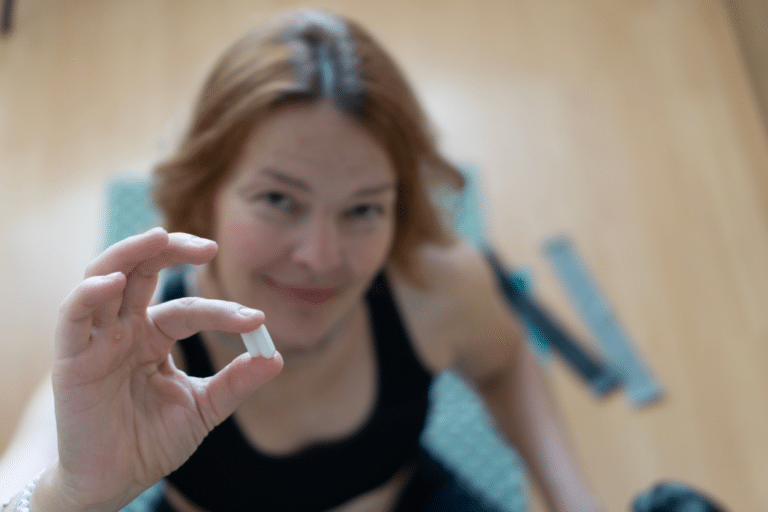Hormones may be the last thing on your mind when you’re suffering from gut issues like bloating, diarrhea, reflux on constipation. But the relationship between the two is very important for your overall health. As you enter perimenopause, you may have noticed more of these signs that something is off.
Last week, we focused on gut health and mood; this week, we’ll take a look at how your gut and your hormones are connected. Here’s what people don’t talk about when they talk about menopause: the estrobolome, bacteria, and fungi in the gut that influences the estrogen circulating in your system. We have trillions of organisms in our gut microbiome and many of them have specific functions. One of those functions is managing our estrogen metabolism. If you don’t have the type of bacteria and fungi that make up the estrobolome, you will not break estrogen down. When it isn’t broken down and metabolized, it can’t be used to do its jobs, which include contributing to cognitive function, mood regulation, skin and hair health, and even protecting against heart disease. Finally, if estrogen isn’t metabolized, it gets stored in the body, and that’s when it can become toxic.
Signs of an unhealthy estrobolome may include:
- Digestive issues (bloating, gas, diarrhea, or constipation)
- Weight changes
- Food sensitivities
- Fatigue
- Skin irritation (yep, it’s true)
- Autoimmune conditions
- Hormone imbalance
But here’s what’s really cool about the estrobolome, according to the experts: we actually have a lot of control over its makeup, which in turn can make menopause symptoms easier to manage. The key, of course, is knowing how to manipulate it. For any woman looking to keep a healthy body well into menopause, understanding the relationship between your gut and hormones is absolutely critical.
How to Love Up Your Gut
- Ditch the sugar. Sugar, especially artificial sweeteners, has the tendency to contribute to the imbalance of gut microbes. This can overwhelm the good bacteria and cause digestive issues. If you find yourself craving sweets, then it’s best to stick to naturally sweet foods like fruit.

- Take prebiotics and probiotics (use the code: DrAnna to order). Prebiotics feed the good bacteria. The addition of healthy bacteria via probiotics can aid the breakdown of food. Fermented foods such as kefir and soybeans, as well as yogurt, kimchi, and pickled vegetables, are all naturally rich in healthy gut bacteria. However, if you suspect SIBO, fermented foods and some probiotics can make this worse. Look for a soil-based probiotic. These generally have multiple bacillus strains in them. The type of probiotics used should also be rotated every 3-4 months to prevent overgrowth of the supplemented microbes.
- Consider food sensitivities. New ones can pop up during midlife and result in intestinal inflammation. You can get more information on that here: https://drannagarrett.com/food-sensitivity-testing/
- Mind your meds. Gut health is negatively impacted by some medications including stomach acid reducers (PPIs), metformin, birth control pills, and hormone replacement therapy.
- Develop good eating hygiene habits. What does this mean? Chewing your food well, limiting liquids during meals, eating mindfully, and stopping when you are 80% full.
- Avoid environmental pollutants. Pesticides, herbicides, and a number of environmental chemicals are a double whammy; they can negatively shift the microbiome and they also act directly as endocrine disruptors. To support a healthy microbiome, reduce your overall exposure to environmental pollutants by choosing organic when you can and avoiding other endocrine disruptors.
Conclusion
An unhealthy estrobolome can contribute to higher levels of estrogen and more problems with estrogen dominance during perimenopause and menopause. The more your symptoms fluctuate, the more you should be paying attention to your gut health. Notice the effect that different foods have on your GI tract and how your hormone symptoms come and go. A food and/or symptom journal can help sort this out.
Consider testing like the GI Map test or food sensitivity testing to identify the root causes of GI distress. Please email info@drannagarrett.com if you’d like more information about ways we can work together.
Dr. Anna Garrett is a menopause expert and Doctor of Pharmacy. She helps women who are struggling with symptoms of perimenopause and menopause find natural hormone balancing solutions so they can rock their mojo through midlife and beyond. Dr. Anna is the author of Perimenopause: The Savvy Sister’s Guide to Hormone Harmony. Order your copy at www.perimenopausebook.com.
Dr. Anna is available for 1-1 consultation. Find out more at www.drannagarrett.com/lets-talk




